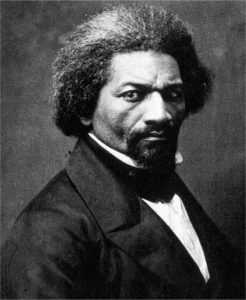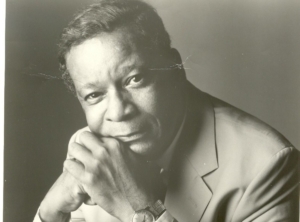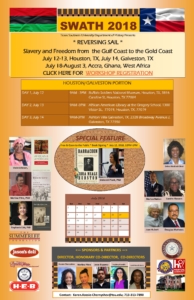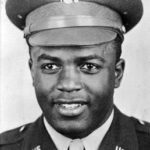When the Fourth of July Was a Black Holiday
After the Civil War, African Americans in the South transformed Independence Day into a celebration of their newly won freedom.
(Photo: Wesley Hitt / Getty Images)
(The Atlantic) “What, to the American slave, is your 4th of July?” Famed black abolitionist and former slave Frederick Douglass posed this question before a large, mostly white crowd in Rochester, New York on July 5, 1852. It is “a day that reveals to him, more than all other days in the year, the gross injustice and cruelty to which he is the constant victim,” Douglass explained, adding that he felt much the same: “I am not included within the pale of this glorious anniversary! … This Fourth [of] July is yours not mine.”
A little over a decade later, however, African Americans like Douglass began making the glorious anniversary their own. After the end of the Civil War in 1865, the nation’s four million newly emancipated citizens transformed Independence Day into a celebration of black freedom. The Fourth became an almost exclusively African American holiday in the states of the former Confederacy—until white Southerners, after violently reasserting their dominance of the region, snuffed these black commemorations out.
Before the Civil War, white Americans from every corner of the country had annually marked the Fourth with feasts, parades, and copious quantities of alcohol. A European visitor observed that it was “almost the only holy-day kept in America.” Black Americans demonstrated considerably less enthusiasm. And those who did observe the holiday preferred—like Douglass—to do so on July 5 to better accentuate the difference between the high promises of the Fourth and the low realities of life for African Americans, while also avoiding confrontations with drunken white revelers. (more)
“The Meaning of July Fourth for the Negro”
(PBS) During the 1850s, Frederick Douglass typically spent about six months of the year travelling extensively, giving lectures. During one winter — the winter of 1855-1856 — he gave about 70 lectures during a tour that covered four to five thousand miles. And his speaking engagements did not halt at the end of a tour. From his home in Rochester, New York, he took part in local abolition-related events.
On July 5, 1852, Douglass gave a speech at an event commemorating the signing of the Declaration of Independence, held at Rochester’s Corinthian Hall. It was biting oratory, in which the speaker told his audience, “This Fourth of July is yours, not mine. You may rejoice, I must mourn.” And he asked them, “Do you mean, citizens, to mock me, by asking me to speak to-day?”
Within the now-famous address is what historian Philip S. Foner has called “probably the most moving passage in all of Douglass’ speeches.”
Click here for full text of speech.
Playwright Ted Shine, a prolific contributor to the Black Arts Movement, dies at 87
(Dallas News) Ted Shine, a prolific playwright, educator and leader in the Black Arts Movement of the 1960s and ’70s who inspired generations, died on June 18 in Dallas. He was 87.
Theodis Wesley Shine Jr., PhD, was also a longtime professor and head of the Drama Department at Prairie View A&M University from 1967 until his retirement in 2015.
His niece Rhonda Boutte’ said he died of natural causes at Dallas Methodist Hospital.
Shine wrote more than 100 plays. His work was honored for its realism, plot twists and thought-filled commentary that brought a black perspective to the human condition.
His play Herbert III was included in the 1974 anthology Black Theater, USA: Plays by African Americans. Shine served as consultant to editor James V. Hatch and helped him update the anthology through the 1990s. The collection became a standard textbook that brought attention to black playwrights in theater classes across the country. (more)
SWATH 2018 Workshop
Reversing Sail: Slavery and Freedom from the Gulf Coast to the Gold Coast–A Journey through Time and Space
SWATH (Summer Workshop on African American Texas History) is designed with life-long learners in mind, particularly those want to broaden and deepen their understanding of African American history and culture. SWATH emerged from a course syllabus on Modern African American History and grew into a vibrant three-day workshop offering face-to-face (and soon online) educational opportunities to teachers, students, community leaders, and others interested in African American Texas History. Please consider joining SWATH today!
This year’s workshops are set for July 12-14:
July 12, 9AM – 3PM Buffalo Soldiers National Museum, 3816 Caroline St, Houston
July 13, 9AM – 3PM African American Library at the Gregory School, 1300 Victor St., Houston
July 14, 9AM-3PM Ashton Villa Galveston, TX, 2328 Broadway Avenue J, Galveston
Click here for more information.
TIPHC Bookshelf
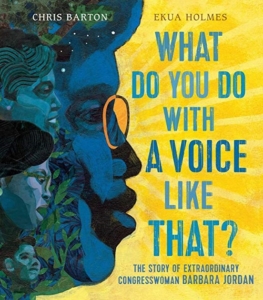 Published scholarship on black history in Texas is growing and we’d like to share with you some suggested readings, both current and past, from some of the preeminent history scholars in Texas and beyond. We invite you to take a look at our bookshelf page – including a featured selection – and check back as the list grows. A different selection will be featured each week. We welcome suggestions and reviews. This week, we offer, “What Do You Do with A Voice Like That?” by Chris Barton, illustrated by Euka Holmes.
Published scholarship on black history in Texas is growing and we’d like to share with you some suggested readings, both current and past, from some of the preeminent history scholars in Texas and beyond. We invite you to take a look at our bookshelf page – including a featured selection – and check back as the list grows. A different selection will be featured each week. We welcome suggestions and reviews. This week, we offer, “What Do You Do with A Voice Like That?” by Chris Barton, illustrated by Euka Holmes.
Even as a child growing up in the Fifth Ward of Houston, Texas, Barbara Jordan stood out for her big, bold, booming, crisp, clear, confident voice. It was a voice that made people sit up, stand up, and take notice.
So what do you do with a voice like that?
Barbara took her voice to places few African American women had been in the 1960s: first law school, then the Texas state senate, then up to the United States congress. Throughout her career, she persevered through adversity to give voice to the voiceless and to fight for civil rights, equality, and justice.
New York Times bestselling author Chris Barton and Caldecott Honoree Ekua Holmes deliver a remarkable picture book biography about a woman whose struggles and mission continue to inspire today.
This Week in Texas Black History
July 1
 University of Houston and Olympic sprint and long jump star Carl Lewis was born on this date in 1961 in Birmingham, Alabama. Lewis graduated from Willingboro (N.J.) High School in 1979 and entered UH as the top-ranked high school track athlete in the country. He kept his top national ranking in the long jump and the 100-meter dash at the 1981 National Collegiate Athletic Association (NCAA) indoor championships and was the first athlete to win two events at an NCAA championship. As an Olympian, Lewis became the first African-American athlete since Jesse Owens in 1936 to win four gold medals in Olympic competition. Lewis won nine gold medals combined in the 100 and 200 meter sprints, the 4×100 meter relay, and the long jump, in four consecutive Olympics – 1984 Los Angeles, 1988 Seoul, 1992 Barcelona, and 1996 Atlanta. He won gold eight times in World Championships competitions. In December 2001, Lewis was elected to the National Track and Field Hall of Fame, was voted “Sportsman of the Century” by the International Olympic Committee, and “Olympian of the Century” by Sports Illustrated magazine.
University of Houston and Olympic sprint and long jump star Carl Lewis was born on this date in 1961 in Birmingham, Alabama. Lewis graduated from Willingboro (N.J.) High School in 1979 and entered UH as the top-ranked high school track athlete in the country. He kept his top national ranking in the long jump and the 100-meter dash at the 1981 National Collegiate Athletic Association (NCAA) indoor championships and was the first athlete to win two events at an NCAA championship. As an Olympian, Lewis became the first African-American athlete since Jesse Owens in 1936 to win four gold medals in Olympic competition. Lewis won nine gold medals combined in the 100 and 200 meter sprints, the 4×100 meter relay, and the long jump, in four consecutive Olympics – 1984 Los Angeles, 1988 Seoul, 1992 Barcelona, and 1996 Atlanta. He won gold eight times in World Championships competitions. In December 2001, Lewis was elected to the National Track and Field Hall of Fame, was voted “Sportsman of the Century” by the International Olympic Committee, and “Olympian of the Century” by Sports Illustrated magazine.
July 1
The Acres Homes Transit Company became the first African-American-owned bus franchise in the South on this day in 1959 when it received state certification. The predominantly black Acres Homes residents lived outside Houston’s city limits and nine miles northwest of downtown and had petitioned city hall for a permit to operate the franchise. The Yale Street Bus Line had ceased commuter service to the area the previous year. Four AHTC buses made 43 round trips a day between downtown Houston and Acres Homes, which was annexed to Houston in 1967.
July 3
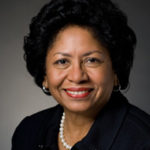 Ruth J. Simmons was born on this day in 1945 in Grapeland and 56 years to the day was sworn in as the 18th president of Brown University in 2001, becoming the first black president of an Ivy League school and the first female president at Brown (founded in 1764). Simmons was the youngest of 12 children born to a sharecropper father and a mother who worked as a maid. In 1995, Simmons became the first African-American woman to head a major college or university when she was selected as president of Smith College, which she led until 2001. She also served as Vice Provost at Princeton University, and a Provost at Spelman College. Simmons graduated from Phillis Wheatley High School in Houston and Dillard University, a historically black college in New Orleans. She earned her Ph.D. in Romance Languages and Literatures from Harvard. In June 2017, she was named interim president of Prairie View A&M University.
Ruth J. Simmons was born on this day in 1945 in Grapeland and 56 years to the day was sworn in as the 18th president of Brown University in 2001, becoming the first black president of an Ivy League school and the first female president at Brown (founded in 1764). Simmons was the youngest of 12 children born to a sharecropper father and a mother who worked as a maid. In 1995, Simmons became the first African-American woman to head a major college or university when she was selected as president of Smith College, which she led until 2001. She also served as Vice Provost at Princeton University, and a Provost at Spelman College. Simmons graduated from Phillis Wheatley High School in Houston and Dillard University, a historically black college in New Orleans. She earned her Ph.D. in Romance Languages and Literatures from Harvard. In June 2017, she was named interim president of Prairie View A&M University.
July 4
 On this date in 1867, the Texas Republican Party was formed at a convention in Houston with African-American delegates outnumbering whites by a total of about 150 to 20. Blacks, comprising about 90 percent of the party throughout Reconstruction, would set the foundation for the party. Forty-four black Republicans would serve in the state legislature. The second State GOP Chairman, Norris Wright Cuney, an African-American from Galveston led the Party from 1883 to 1897 and is said by historians to have held “the most important political position given to a black man of the South in the nineteenth century.”
On this date in 1867, the Texas Republican Party was formed at a convention in Houston with African-American delegates outnumbering whites by a total of about 150 to 20. Blacks, comprising about 90 percent of the party throughout Reconstruction, would set the foundation for the party. Forty-four black Republicans would serve in the state legislature. The second State GOP Chairman, Norris Wright Cuney, an African-American from Galveston led the Party from 1883 to 1897 and is said by historians to have held “the most important political position given to a black man of the South in the nineteenth century.”
July 4
On this date in 2003, R&B singer and composer Barry White, a Galveston native, died at age 58 of renal failure in Los Angeles. A five-time Grammy Award winner, White’s gravelly, seductive, bass voice earned him 106 gold and 41 platinum albums, 20 gold and 10 platinum singles, with worldwide sales in excess of $100 million. White had suffered with high blood pressure for many years and then diabetes.
July 6
In 1944, at Fort Hood Army Post in Killeen, Lt. Jackie Robinson refused to move to the back of a post bus and was taken into custody by military police, an incident that would lead to his court-martial. Three years before he would break the color line in Major League Baseball, Robinson was charged with insubordination, disturbing the peace, drunkenness (he did not drink), conduct unbecoming an officer, and refusing to obey the lawful orders of a superior officer. Robinson, serving in a support role for the all-black 761st Tank Battalion (the Army’s first such unit), would be acquitted a month later by an all-white panel of nine officers. (See, National Archives: “Jim Crow, Meet Lieutenant Robinson, A 1944 Court-Martial“, and The History Reader, “The Court Martial of Jackie Robinson.”)
Blog: Ron Goodwin, Ph.D., author, PVAMU history professor
Ron Goodwin is an assistant professor of history at Prairie View A&M University. Even though he was a military “brat,” he still considers San Antonio home. Like his father and brother, Ron joined the U.S. Air Force and while enlisted received his undergraduate degree from Texas Lutheran University in Seguin, Texas. After his honorable discharge, he completed graduate degrees from Texas Southern University. Goodwin’s book, Blacks in Houston, is a pictorial history of Houston’s black community. His most recent book, Remembering the Days of Sorrow, examines the institution of slavery in Texas from the perspective of the New Deal’s Slave Narratives.
Recent Posts
King of Kings
During his lifetime Martin Luther King consistently paralleled the experiences of the biblical Children of Israel and the experiences of Africans in America. As a result, he thrust himself into the role of Moses. What I find interesting in these parallels was the ultimate goal of the story. The Children of Israel, after 400 years of bondage, eventually made their way to the Promised Land. This was the message that I believe King was ultimately…
Wakanda Forever — Part 2
The internet records the following regarding the financial success of the Black Panther as of March 25, 2018: Receipts grossed $631.4 million in the US and Canada and a worldwide total of $1.239 billion; The film made $370.5 million worldwide in its opening weekend (the 15th largest of all time); Thus far, Black Panther is the highest-grossing solo superhero film and the 3rd third highest-grossing movie in the Marvel Cinematic Universe (MCU); and In only five weeks after…
Submissions wanted
Historians, scholars, students, lend us your…writings. Help us produce the most comprehensive documentation ever undertaken for the African American experience in Texas. We encourage you to contribute items about people, places, events, issues, politics/legislation, sports, entertainment, religion, etc., as general entries or essays. Our documentation is wide-ranging and diverse, and you may research and write about the subject of your interest or, to start, please consult our list of suggested biographical entries and see submission guidelines. However, all topics must be approved by TIPHC editors before beginning your research/writing.
We welcome your questions or comments. Please contact Mr. Michael Hurd, Director of TIPHC, at mdhurd@pvamu.edu.
Click edit button to change this text.

